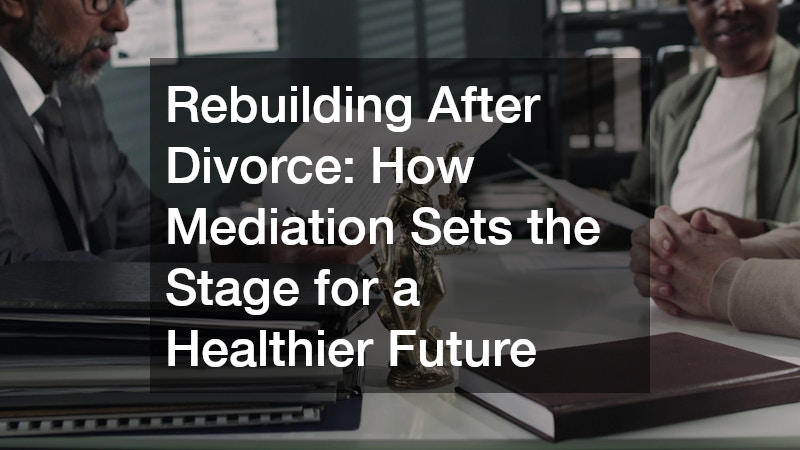
Key Takeaways:
- Mediation promotes emotional healing by replacing conflict with cooperation.
- Certified mediation attorneys balance legal expertise with empathy.
- Children benefit from peaceful co-parenting and reduced exposure to conflict.
- Financial savings make mediation a practical alternative to litigation.
- Healthier communication paves the way for stable post-divorce relationships.
- Rebuilding after divorce becomes possible when both sides work toward mutual respect and shared goals.

Divorce is never easy. It brings emotional upheaval, lifestyle changes, and difficult decisions that can alter the course of a family’s life. However, in recent years, a growing number of couples have chosen a path that focuses on healing rather than hostility—family-focused mediation. With guidance from divorce attorneys certified in family-focused mediation to avoid court battles, separating couples can rebuild their lives while minimizing the emotional and financial toll of litigation.
This article explores how mediation helps individuals transition after divorce, the critical role of certified mediation attorneys, and how this process creates a healthier future for both parties and their children.
1. The Emotional Aftermath of Divorce
Divorce is not just a legal event—it’s an emotional journey. Couples often experience grief, guilt, anger, or even relief. These feelings can cloud judgment and make decision-making harder. Traditional court proceedings can intensify this stress by pitting spouses against each other in an adversarial process.
Mediation, on the other hand, shifts the focus. It encourages constructive dialogue and cooperation, reducing tension during one of the most emotionally charged times in life. Divorce attorneys trained in family-focused mediation help clients stay calm, think clearly, and prioritize long-term emotional well-being over short-term victories.
Key emotional challenges after divorce:
- Loss of identity and self-esteem after years in a partnership
- Fear of financial instability or starting over
- Concerns about how children will adjust
- Unresolved anger or resentment that complicates communication
Mediation helps address these emotional challenges by creating a safe, structured environment for honest conversation and mutual respect.
2. Why Traditional Litigation Can Make Healing Harder
Many divorcing couples initially assume that going to court is the only way to finalize a divorce. Unfortunately, litigation can worsen emotional wounds and drain financial resources. Court battles often last months—or even years—while legal fees escalate and bitterness deepens.
When attorneys approach divorce through the courtroom lens, the goal often becomes winning rather than understanding. This approach can leave lasting scars, especially if children are involved.
The downsides of courtroom divorce include:
- Emotional trauma: Public hearings and confrontations increase stress.
- Financial burden: Legal fees, expert witnesses, and court costs add up quickly.
- Loss of control: A judge makes the final decision, not the couple.
- Damage to co-parenting relationships: Adversarial tactics erode trust and respect.
In contrast, divorce lawyers certified in family-focused mediation to avoid court battles promote collaboration over confrontation, helping both sides move forward with dignity and peace.
3. Understanding Family-Focused Mediation

Family-focused mediation is a voluntary, confidential process where a neutral mediator helps couples reach agreements on key divorce issues—such as property division, child custody, and spousal support—without going to court. The mediator does not take sides but ensures both parties are heard and respected.
What makes this process truly unique is the role of divorce attorneys certified in family-focused mediation. These professionals are trained not only in family law but also in conflict resolution, negotiation, and emotional intelligence. Their expertise bridges the gap between legal knowledge and emotional awareness—two essential components of a healthy divorce process.
Core principles of family-focused mediation:
- Neutral facilitation: The mediator helps guide discussion, not dictate terms.
- Informed decision-making: Attorneys provide legal insight without dominating the process.
- Confidentiality: What happens in mediation stays private.
- Empowerment: Couples make their own agreements, fostering mutual respect and ownership.
- Future orientation: The focus is on rebuilding, not rehashing the past.
With skilled mediators guiding the way, couples often find themselves reaching compromises faster and with far less emotional strain than they would in court.
4. The Role of Divorce Attorneys Certified in Family-Focused Mediation
The success of mediation depends heavily on the qualifications and approach of the professionals involved. Divorce lawyers certified in family-focused mediation to avoid court battles play a pivotal role in ensuring that both the emotional and legal aspects of the process are handled with care.
These attorneys are not typical litigators. Instead of preparing for a courtroom fight, they prepare their clients for constructive conversation. They balance advocacy with empathy, helping clients understand their rights while also encouraging cooperation.
Key functions of certified mediation attorneys:
- Legal guidance: Explain rights and obligations clearly, ensuring fair agreements.
- Conflict resolution: Use negotiation techniques to defuse tension and prevent escalation.
- Emotional balance: Help clients separate personal pain from practical decision-making.
- Documentation: Draft clear, enforceable agreements that comply with legal standards.
- Post-divorce support: Offer advice on modifying agreements or addressing new issues peacefully.
By focusing on solutions rather than blame, these attorneys help clients achieve closure and stability.
5. How Mediation Encourages Healthier Communication
One of the greatest gifts mediation offers is improved communication. When a couple learns to discuss difficult issues respectfully, they set a powerful example for their children and lay the foundation for better post-divorce relationships.
Traditional divorces often leave couples unable to speak civilly to each other. Family-focused mediation, on the other hand, prioritizes listening and mutual understanding.
How mediation improves communication:
- Active listening: Each person gets the chance to speak without interruption.
- Reframing: Mediators help transform accusatory statements into productive dialogue.
- Problem-solving mindset: Couples learn to focus on “how can we fix this?” rather than “who’s to blame?”
- Emotional safety: A neutral mediator ensures neither party feels attacked.
Even after the divorce is finalized, these skills help former partners maintain a cooperative relationship—especially when co-parenting.
6. Financial Advantages of Choosing Mediation Over Litigation
Financial strain is one of the most stressful aspects of divorce. Legal battles can consume savings, retirement funds, or even the equity in a home. Mediation provides a smarter financial path forward.
Because it eliminates prolonged hearings, witness fees, and excessive attorney hours, family-focused mediation significantly reduces overall costs. More importantly, it helps both parties create budgets and settlements that reflect realistic post-divorce financial stability.
Financial benefits of mediation:
- Lower legal fees: Couples pay for sessions rather than lengthy court proceedings.
- Faster resolution: Agreements can often be reached within weeks instead of months.
- Flexible solutions: Couples can design creative financial arrangements that fit their circumstances.
- Reduced future conflict: Clear agreements lessen the likelihood of costly disputes later.
Working with divorce attorneys certified in family-focused mediation to avoid court battles ensures that both fairness and financial security remain top priorities.
7. Protecting Children Through Family-Focused Mediation
When children are involved, divorce becomes even more delicate. Studies consistently show that children cope better when their parents handle divorce respectfully and communicate effectively. Mediation provides the structure to do just that.
In courtroom battles, children often feel caught in the middle. Mediation shields them from conflict while giving parents tools to make joint decisions in their best interests.
How mediation benefits children:
- Reduces exposure to conflict: Children aren’t drawn into adversarial court hearings.
- Encourages joint parenting: Parents work together to create custody and visitation plans.
- Promotes emotional stability: Cooperative decision-making reassures children of continued love and support.
- Improves long-term relationships: Parents learn to communicate calmly about school, health, and activities.
By choosing divorce attorneys certified in family-focused mediation, parents demonstrate commitment to their children’s emotional well-being, even amid separation.
8. Building a Healthier Future Through Cooperative Agreements
A divorce settlement should not only end a marriage—it should lay the groundwork for a stable future. Through family-focused mediation, couples are empowered to make decisions that reflect shared goals rather than imposed judgments.
Whether it’s co-parenting arrangements, financial responsibilities, or property division, mediation encourages fairness and foresight. It also allows couples to adapt agreements to changing circumstances more easily than court-ordered decrees.
Elements of a healthy mediation-based divorce agreement:
- Fair asset division: Ensures both parties have financial stability.
- Clear parenting plans: Provides structure while allowing flexibility.
- Defined communication boundaries: Reduces conflict and confusion.
- Post-divorce cooperation: Sets expectations for respectful interaction.
- Future review mechanisms: Allows periodic updates to reflect life changes.
In essence, mediation creates not just a divorce agreement—but a roadmap for a peaceful post-divorce life.
9. The Mediation Process Step-by-Step
Understanding what to expect helps couples approach mediation with confidence. While every case is unique, most family-focused mediation processes follow a similar structure.
Step 1: Consultation
Each spouse meets with a mediator or divorce attorney certified in family-focused mediation to discuss goals, issues, and the mediation process.
Step 2: Joint Sessions
The couple meets in a neutral setting to discuss major decisions—such as custody, support, and property division—guided by the mediator.
Step 3: Negotiation and Compromise
The mediator helps both sides explore creative solutions that satisfy each party’s priorities.
Step 4: Drafting the Agreement
Once consensus is reached, the mediator drafts a written agreement for review by each party’s attorney.
Step 5: Court Filing
The final agreement is submitted to the court for approval, usually with minimal delay or dispute.
This structured yet flexible process ensures that couples retain control while receiving the legal protection they need.
10. When Mediation May Not Be Appropriate
While mediation offers numerous benefits, it’s not suitable for every situation. In cases involving abuse, extreme power imbalances, or hidden assets, direct court intervention may be necessary.
Situations where mediation might not work:
- Domestic violence or threats of harm
- Severe financial dishonesty or concealment of assets
- Substance abuse impacting decision-making
- One party unwilling to participate in good faith
Even so, divorce attorneys trained in family-focused mediation can often identify hybrid approaches—such as “shuttle mediation” (where parties meet separately)—to minimize risk and improve outcomes.
11. Post-Mediation: Healing and Rebuilding
Completing mediation is not the end—it’s the beginning of a new chapter. Rebuilding after divorce means rediscovering independence, nurturing emotional health, and reimagining the future.
The communication and problem-solving skills gained during mediation often extend far beyond the divorce process. They help individuals handle future challenges—from co-parenting to career changes—with resilience and respect.
Tips for rebuilding after divorce:
- Invest in self-care: Prioritize physical and emotional healing.
- Create new routines: Establish structure and stability in your daily life.
- Seek support: Consider therapy or support groups to process emotions.
- Focus on goals: Set short- and long-term personal and professional goals.
- Co-parent positively: Keep your child’s needs at the center of all decisions.
Through mediation, former spouses often find closure not by forgetting the past but by transforming it into a foundation for growth.
12. Why More Couples Are Turning to Certified Mediation Attorneys
As awareness grows, more couples are discovering the benefits of working with divorce attorneys certified in family-focused mediation to avoid court battles. The shift reflects a broader social trend—prioritizing emotional intelligence, cooperation, and compassion in resolving family disputes.
Couples today value privacy, efficiency, and control. They recognize that fighting in court rarely leads to healing. Certified mediation attorneys offer a path that aligns with these modern values.
Reasons for the rising popularity of family-focused mediation:
- Desire for privacy and confidentiality
- Faster, more cost-effective outcomes
- Healthier family dynamics post-divorce
- Reduced stress for children and extended family
- Increased satisfaction with the final settlement
In short, mediation isn’t just a legal alternative—it’s a life choice that promotes well-being and mutual respect.
Final Thoughts: Choosing Peace Over Conflict
Rebuilding after divorce requires courage, self-awareness, and the right support system. By choosing divorce attorneys certified in family-focused mediation to avoid court battles, couples can end their marriage with empathy rather than animosity.
Mediation helps transform divorce from a destructive experience into a constructive one—where both parties emerge stronger, wiser, and better prepared for the future. It’s a process grounded in understanding, guided by fairness, and focused on healing.